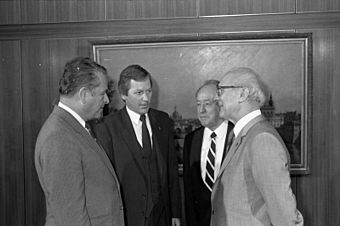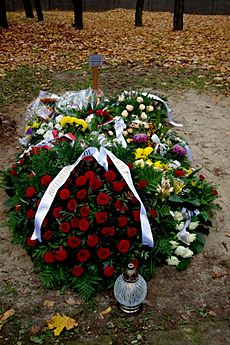Czesław Kiszczak facts for kids
Quick facts for kids
Czesław Kiszczak
|
|
|---|---|
 |
|
| 10th Prime Minister of Polish People's Republic | |
| In office 2 August 1989 – 19 August 1989 |
|
| President | Wojciech Jaruzelski |
| Preceded by | Mieczysław Rakowski |
| Succeeded by | Tadeusz Mazowiecki |
| Minister of Internal Affairs of Poland | |
| In office 31 July 1981 – 6 July 1990 |
|
| President | Wojciech Jaruzelski |
| Prime Minister | Wojciech Jaruzelski Zbigniew Messner Mieczysław Rakowski Czesław Kiszczak Tadeusz Mazowiecki |
| Preceded by | Mirosław Milewski |
| Succeeded by | Krzysztof Kozłowski |
| Personal details | |
| Born | 19 October 1925 Roczyny, Kraków Voivodeship, Second Polish Republic |
| Died | 5 November 2015 (aged 90) Warsaw, Poland |
| Resting place | Orthodox Cemetery (Warsaw) |
| Political party | Polish United Workers' Party |
| Spouse | Maria Teresa Kiszczak |
| Children | Ewa Kiszczak Jarosław Kiszczak |
| Military service | |
| Allegiance | Poland |
| Branch/service | Polish People's Army |
| Years of service | 1945–1990 |
| Rank | Generał broni |
Czesław Jan Kiszczak (born October 19, 1925 – died November 5, 2015) was an important Polish general and politician. He served as the Minister of Internal Affairs from 1981 to 1990. He was also the Prime Minister for a short time in 1989.
In 1981, he played a big part in putting martial law into effect in Poland. This was done to control the Solidarity movement, which was a large group of workers asking for more freedom. However, eight years later, he helped Poland change to a democracy. He was the last communist prime minister and helped lead important talks called the Round Table conference. In these talks, the ruling communist party met with leaders of the democratic opposition. These meetings led to Solidarity being allowed again, new elections in 1989, and Poland getting its first non-communist government since 1945.
Contents
Early Life
Czesław Kiszczak was born on October 19, 1925, in a village called Roczyny. His father was a farmer who lost his job as a steelworker because he supported communism. Because of his father's beliefs, Czesław grew up in a home that was against the church and supported the Soviet Union.
During World War II, in 1942, when he was 16, German soldiers arrested Kiszczak, his mother, older brother, and aunt. They were sent to work as forced laborers. Czesław first worked in a German coal mine. Later, he was sent to Austria to work as a slave laborer. He was the only Pole among workers from other countries. Near the end of the war, he was in Vienna, working on the Austrian train system. In April 1945, he joined a communist-led group that fought against the Nazis. This group worked with the Red Army. Kiszczak helped the Russians in Vienna because he could speak both Russian and German.
Military Career
After the war, Kiszczak went back to Poland. He quickly joined the communist Polish Workers' Party. He was sent to a special school in Łódź that trained people for civilian and military roles in the Party. Kiszczak then joined the Polish People's Army. He fought against groups that were resisting the communist government.
Kiszczak later explained that these early struggles helped him decide what to do during the pro-democracy protests many years later. He said he didn't want that "tragic history to repeat itself."
He became an officer and was assigned to military intelligence. In 1946, he went to the Polish office in London. His job was to help Polish soldiers who had fought in the war in the West return home. His bosses thought he was a very eager and disciplined young officer.
In the 1950s, he continued to rise in the military. He became a chief of a department in the 18th Infantry Division. Later, he moved to Warsaw and took on more important roles in military intelligence.
From 1954 to 1957, Kiszczak studied at the Polish General Staff Academy. After graduating, he joined a new counter-intelligence agency called the Internal Military Service (WSW). From 1957 to 1965, he led the counter-intelligence for the Navy. In 1967, he became the deputy head of the WSW.
By the late 1960s, Kiszczak held top positions in the Polish military and intelligence services. In 1973, he became a general. From 1972 to 1979, he led military intelligence. In 1978, he became a deputy head of the Polish General Staff. In 1979, Kiszczak returned to military counter-intelligence and led the Internal Military Service until 1981.
Minister of Internal Affairs

In July 1981, Kiszczak was made the Minister of Internal Affairs. This ministry, along with the Ministry of National Defense, was one of the largest and most powerful government departments in Poland. It was in charge of the police, the secret police, government protection, and other important services.
In this role, Kiszczak helped prepare and carry out martial law, which was declared in Poland on December 13, 1981. He became a member of the Military Council of National Salvation, a group that ran Poland during martial law (1981–1983). From December 1981 until June 1989, Kiszczak was the second most important person in Poland, after General Wojciech Jaruzelski. Together, they led the efforts to control Solidarity, which was the first non-communist labor union movement in the Eastern Bloc. Martial law meant that Solidarity activists were arrested, curfews were put in place, and other strict rules were enforced.
Generals Kiszczak and Jaruzelski later said they imposed martial law to stop a possible invasion by the Soviet Union. They feared the Soviets would invade, just like they did in Czechoslovakia in 1968 during the Prague Spring. Kiszczak said years later, "I saved the country from terrible troubles." However, critics said that Jaruzelski and Kiszczak were simply following Moscow's orders. They pointed to tragic events, like the shooting of nine protesting miners by the police during the Pacification of Wujek operation.
As Minister of Internal Affairs, Kiszczak was also involved in a controversial case regarding the death of Grzegorz Przemyk in 1983. There were accusations that Kiszczak ordered a cover-up in this case. This led to others being wrongly accused and imprisoned. Kiszczak was not punished for his role in this cover-up.
However, Kiszczak also took action in another important case. In 1984, he oversaw the investigation and punishment of secret police officers who had kidnapped and murdered a pro-Solidarity priest named Jerzy Popiełuszko. This action was seen by some as a positive step.
By the late 1980s, big changes were happening in the Soviet Union under Mikhail Gorbachev's leadership. Poland's economy was also getting worse. Kiszczak then began talks with the opposition, which led to the Polish Round Table Agreement. This agreement allowed Solidarity to be recognized again and set the rules for the 1989 elections. Solidarity candidates won almost all the seats they were allowed to compete for in the National Assembly.
Kiszczak was named prime minister in 1989, but Solidarity did not want to join a government led by communists. To stop more worker protests caused by rising food prices, he resigned after a few weeks. He then joined a government mostly led by Solidarity as deputy prime minister and interior minister. He stayed in this role until mid-1990, when he left politics.
Later Years
Czesław Kiszczak, along with General Jaruzelski, remains a very debated person in Polish history. Some people see him as a patriot who helped Poland avoid more violence and move towards democracy. They believe he deserves credit for talking with Solidarity leader Lech Wałęsa at the Round Table talks. These talks led to partly free elections in 1989 and the end of communism in Poland.
However, other people strongly criticize him for the harsh actions taken during the communist era. They accuse him of causing suffering for many Poles and acting in the interests of Moscow. Many Poles were frustrated that Kiszczak was never severely punished for martial law and other strict measures, even though some lower-level police officers were. Kiszczak was tried in court several times for his role in martial law. He was found not guilty in the deaths of miners at the Wujek coalmine. He received a two-year suspended sentence for his part in imposing martial law, meaning he did not go to prison.
Kiszczak died in Warsaw on November 5, 2015, at the age of 90, due to heart problems. The Polish Ministry of Defence did not allow him to be buried at the military cemetery or have military funeral honors. He was buried at the Orthodox Cemetery in Warsaw with his family and friends. No government or military officials attended the ceremony.
Kiszczak was survived by his wife, Maria, and their children, Ewa and Jarosław.
Legacy
Kiszczak's influence continued even after his death because of a political issue involving secret documents found at his wife's home. In February 2016, a search of their home found documents that supported accusations that Lech Wałęsa had worked with the secret services in the past. It seemed Kiszczak had kept secret files that included evidence of Wałęsa's alleged cooperation, including signed documents using a supposed codename, Bolek. Maria Kiszczak was accused of trying to sell these documents. Wałęsa has always said he is innocent of these accusations and has never been officially found guilty.
Honours
- Order of the Builders of People's Poland (1984)
- Order of the Banner of Work, I class
- Commander's Cross of Order of Polonia Restituta (1972)
- Knight's Cross of Order of Polonia Restituta
- Order of the Cross of Grunwald, III class
- Medal of the 10th Anniversary of People's Poland (1954)
- Medal of the 30th Anniversary of People's Poland (1974)
- Medal of the 40th Anniversary of People's Poland (1984)
- Gold Medal of the Armed Forces in the Service of the Fatherland
- Silver Medal of the Armed Forces in the Service of the Fatherland
- Bronze Medal of the Armed Forces in the Service of the Fatherland
- Gold Medal of Merit for National Defence
- Silver Medal of Merit for National Defence
- Bronze Medal of Merit for National Defence
- Grunwald Badge
- Silver Badge of Merit for Law Enforcement
- Bronze Badge of Merit for Law Enforcement
- Bronze Badge of Merit for Border Protection of PRL
- Order of the Patriotic War, I class (USSR)
- Medal "For Strengthening of Brotherhood in Arms" (USSR)
See also
 In Spanish: Czesław Kiszczak para niños
In Spanish: Czesław Kiszczak para niños
Kiszczak archives - a collection of historical documents, including a file on a secret informant named Bolek, found in Kiszczak's house after he died.
Images for kids
 | William L. Dawson |
 | W. E. B. Du Bois |
 | Harry Belafonte |




